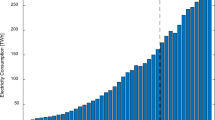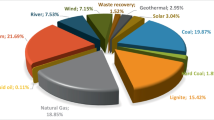Abstract
The energy demand estimation commands great importance for both developing and developed countries in terms of the economy and country resources. In this study, the differential evolution algorithm (DE) was used to forecast the long-term energy demand in Turkey. In addition to being employed for solving regular optimization problems, DE is also a global, meta-heuristic algorithm that enables fast, reliable and operative stochastic searches based on population. Considering the correlation between the increase in certain economic indicators in Turkey and the increase of energy consumption, two equations were used—one applying the linear form and the other the quadratic form. Turkey’s long-term energy demand from 2012 to 2031 was estimated through the DE method in three different scenarios and in terms of the gross domestic product, import, export and population. To prove the success of the DE method in addressing the energy demand problem, the DE method was compared to other methods found in the literature. Results showed that the proposed DE method was more successful than the other methods. Furthermore, the future projections of energy demand obtained using the proposed method were compared to the indicators of energy demand estimated and observed by the Ministry of Energy and Natural Resources.






Similar content being viewed by others
References
Güneş G and Aslan E 2015 Use of renewable energy sources and its effects to sustainable tourism – Turkey example. Doğu Karadeniz Bölgesi Sürdürülebilir Turizm Kongresi. Gümüşhane Üniversitesi Yayınları-31, Gümüshane, Turkey, pp. 221–234
Oğurlu H 2011 Matematiksel Modelleme Kullanarak Türkiye’nin Uzun Dönem Elektrik Yük Tahmini. Selçuk Üniversitesi Fen Bilimleri Enstitüsü
Mahmutoğlu M and Öztürk F 2015 Türkiye Elektrik Tüketimi Öngörüsü ve Bu Kapsamda Geliştirilebilecek Politika Önerileri. In: Proceedings of EY International Congress on Economics II (EYC2015), November 5–6, Ankara, Turkey. Ekonomik Yaklasim Association
Erdogdu E 2007 Electricity demand analysis using cointegration and ARIMA modelling: a case study of Turkey. Energy Policy 35: 1129–1146
Tiris M 2005 Global trends for energy. In: Proceedings of the Turkish Workshop on Sustainable Development: Meeting the Challenges, JuØlich
WECTNC 2013 Energy report-2013. Ankara: World Energy Council (in Turkish), ISSN: 1301-63182014
WECTNC 2014 Energy report-2014. Ankara: World Energy Council (in Turkish), ISSN: 1301-63182015
Kıran M S, Özceylan E, Gündüz M and Paksoy T 2012 A novel hybrid approach based on particle swarm optimization and ant colony algorithm to forecast energy demand of Turkey. Energy Convers. Manage. 53: 75–83
Ünler A 2008 Improvement of energy demand forecasts using swarm intelligence: the case of Turkey with projections to 2025. Energy Policy 36: 1937–1944
TMMOB 2014 Türkiye’nin enerji görünümü. MMO2014
Ediger V Ş and Akar S 2007 ARIMA forecasting of primary energy demand by fuel in Turkey. Energy Policy 35: 1701–1708
Ediger V Ş and Tatlıdil H 2002 Forecasting the primary energy demand in Turkey and analysis of cyclic patterns. Energy Convers. Manage. 43: 473–487
Yumurtaci Z and Asmaz E 2004 Electric energy demand of Turkey for the year 2050. Energy Sources 26: 1157–1164
Akkurt M, Demirel O F and Zaim S 2016 Forecasting Turkey’s natural gas consumption by using time series methods. Eur. J. Econ. Polit. Stud. 3: 1–21
Mucuk M and Uysal D 2009 Turkey’s energy demand. Curr. Res. J. Soc. Sci. 1: 123–128
Dilaver Z and Hunt L C 2011 Industrial electricity demand for Turkey: a structural time series analysis. Energy Econ. 33: 426–436
Sözen A and Arcaklioğlu E 2007 Prospects for future projections of the basic energy sources in Turkey. Energy Sources Part B 2: 183–201
Kankal M, Akpınar A, Kömürcü M I and Özşahin T Ş 2011 Modeling and forecasting of Turkey’s energy consumption using socio-economic and demographic variables. Appl. Energy 88: 1927–1939
Sozen A, Arcaklioglu E and Ozkaymak M 2005 Modelling of Turkey’s net energy consumption using artificial neural network. Int. J. Comput. Appl. Technol. 22: 130–136
Ceylan H and Ozturk H K 2004 Estimating energy demand of Turkey based on economic indicators using genetic algorithm approach. Energy Convers. Manage. 45: 2525–2537
Haldenbilen S and Ceylan H 2005 Genetic algorithm approach to estimate transport energy demand in Turkey. Energy Policy 33: 89–98
Toksarı M D 2007 Ant colony optimization approach to estimate energy demand of Turkey. Energy Policy 35: 3984–3990
Kıran M S and Gündüz M 2013 A recombination-based hybridization of particle swarm optimization and artificial bee colony algorithm for continuous optimization problems. Appl. Soft Comput. 13: 2188–2203
Uguz H and Hakli H 2015 A new algorithm based on artificial bee colony algorithm for energy demand forecasting in Turkey. In: Proceedings of the 4th International Conference on Advanced Computer Science Applications and Technologies (ACSAT), IEEE2015, pp. 56–61
Kıran M S, Özceylan E, Gündüz M and Paksoy T 2012 Swarm intelligence approaches to estimate electricity energy demand in Turkey. Knowl.-Based Syst. 36: 93–103
Ghanbari A, Kazemi S M R, Mehmanpazir F and Nakhostin M M 2013 A Cooperative Ant Colony Optimization-Genetic Algorithm approach for construction of energy demand forecasting knowledge-based expert systems. Knowl.-Based Syst. 39: 194–206
Salcedo-Sanz S, Muñoz-Bulnes J, Portilla-Figueras J A and Del Ser J 2015 One-year-ahead energy demand estimation from macroeconomic variables using computational intelligence algorithms. Energy Convers. Manage. 99: 62–71
Sánchez-Oro J, Duarte A and Salcedo-Sanz S 2016 Robust total energy demand estimation with a hybrid Variable Neighborhood Search – Extreme Learning Machine algorithm. Energy Convers. Manage. 123: 445–452
Özdemir M 2013 Zaman Kısıtı Altında Takım Oryantiring Problemlerinin Yapay Arı Kolonisi Yaklaşımı ile Çözümü. İstanbul Üniversitesi Sosyal Bilimler Enstitüsü
Qin A K, Huang V L and Suganthan P N 2009 Differential evolution algorithm with strategy adaptation for global numerical optimization. IEEE Trans. Evol. Comput. 13: 398–417
Jędrzejowicz P and Skakovski A 2014 Island-based differential evolution algorithm for the discrete–continuous scheduling with continuous resource discretisation. Proc. Comput. Sci. 35: 111–117
Liu Y, Rowe M, Holderbaum W and Potter B 2016 A novel battery network modelling using constraint differential evolution algorithm optimisation. Knowl.-Based Syst. 99: 10–18
Mlakar U, Potočnik B and Brest J 2016 A hybrid differential evolution for optimal multilevel image thresholding. Expert Syst. Appl. 65: 221–232
Rogalsky T, Kocabiyik S and Derksen R 2000 Differential evolution in aerodynamic optimization. Can. Aeronaut. Space J. 46: 183–190
Storn R 1996 On the usage of differential evolution for function optimization. In: Proceedings of the 1996 Biennial Conference of the North American Fuzzy Information Processing Society, NAFIPS, IEEE1996, pp. 519–523
Parouha R P and Das K N 2016 A robust memory based hybrid differential evolution for continuous optimization problem. Knowl.-Based Syst. 103: 118–131
Zorarpacı E and Özel S A 2016 A hybrid approach of differential evolution and artificial bee colony for feature selection. Expert Syst. Appl. 62: 91–103
Maciel L, Gomide F and Ballini R 2016 A differential evolution algorithm for yield curve estimation. Math. Comput. Simul. 129: 10–30
Storn R and Price K 1997 Differential evolution—a simple and efficient heuristic for global optimization over continuous spaces. J. Glob. Optimizat. 11: 341–359
Price K V 1999 An introduction to differential evolution. In: New ideas in optimization. Maidenhead, UK: McGraw-Hill
Price K, Storn R M and Lampinen J A 2006 Differential evolution: a practical approach to global optimization. Springer Science & Business Media
Storn R and Price K 1995 Differential evolution—a simple and efficient adaptive scheme for global optimization over continuous spaces. Berkeley: ICSI
Gämperle R, Müller S D and Koumoutsakos P 2002 A parameter study for differential evolution. Adv. Intell. Syst. Fuzzy Syst. Evol. Comput. 10: 293–298
Karaboğa D 2014 Yapay Zeka Optimizasyon Algoritmalari
Hrstka O and Kučerová A 2004 Improvements of real coded genetic algorithms based on differential operators preventing premature convergence. Adv. Eng. Softw. 35: 237–246
Mayer D, Kinghorn B and Archer A 2005 Differential evolution—an easy and efficient evolutionary algorithm for model optimisation. Agric. Syst. 83: 315–328
Özsağlam M Y and Cunkaş M 2008 Optimizasyon Problemlerinin Çözümü için Parçaçık Sürü Optimizasyonu Algoritması. Politek. Dergisi 11: 299–305
Ronkkonen J, Kukkonen S and Price K V 2005 Real-parameter optimization with differential evolution. In: Proceedings of IEEE CEC2005, pp. 506–513
Bulut Y M and Yıldız Z 2016 Comparing energy demand estimation using various statistical methods: the case of Turkey. Gazi Univ. J. Sci. 29: 237–244
National Statistics (NS) 2016 http://www.tuik.gov.tr (in Turkish)
Central Bank of Turkey (CBT) 2016 http://www.tcmb.gov.tr (in Turkish)
TMMOB 2014 Elektrik enerjisi talep tahmin yöntemleri paneli (e-book, in Turkish)
Geem Z W and Roper W E 2009 Energy demand estimation of South Korea using artificial neural network. Energy Policy 37: 4049–4054
Acknowledgements
This study was supported by the Scientific Research Project of Selcuk University.
Author information
Authors and Affiliations
Corresponding author
Rights and permissions
About this article
Cite this article
BESKIRLI, M., HAKLI, H. & KODAZ, H. The energy demand estimation for Turkey using differential evolution algorithm. Sādhanā 42, 1705–1715 (2017). https://doi.org/10.1007/s12046-017-0724-7
Received:
Revised:
Accepted:
Published:
Issue Date:
DOI: https://doi.org/10.1007/s12046-017-0724-7




